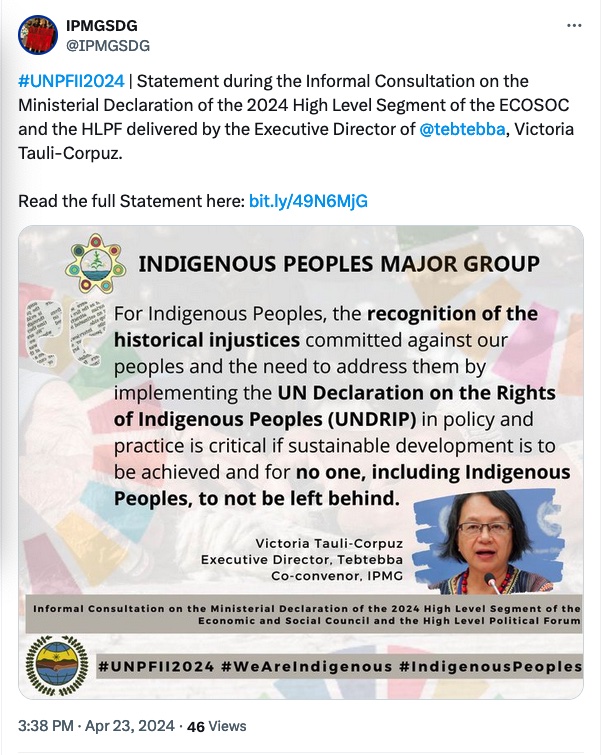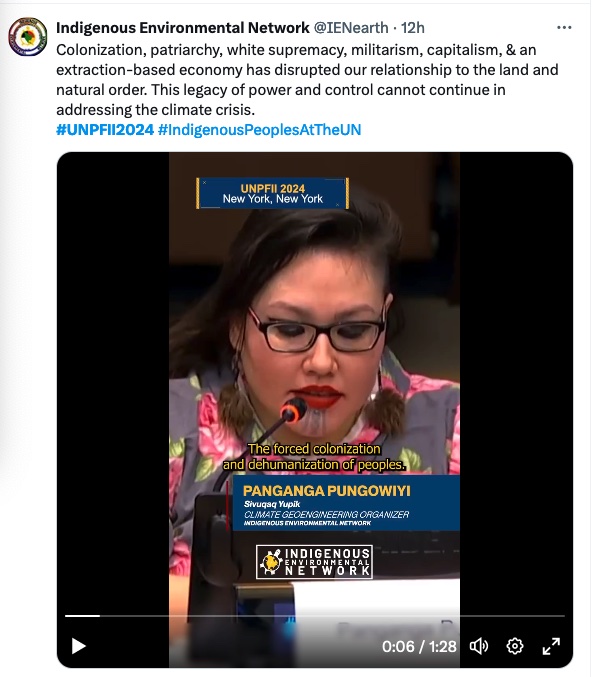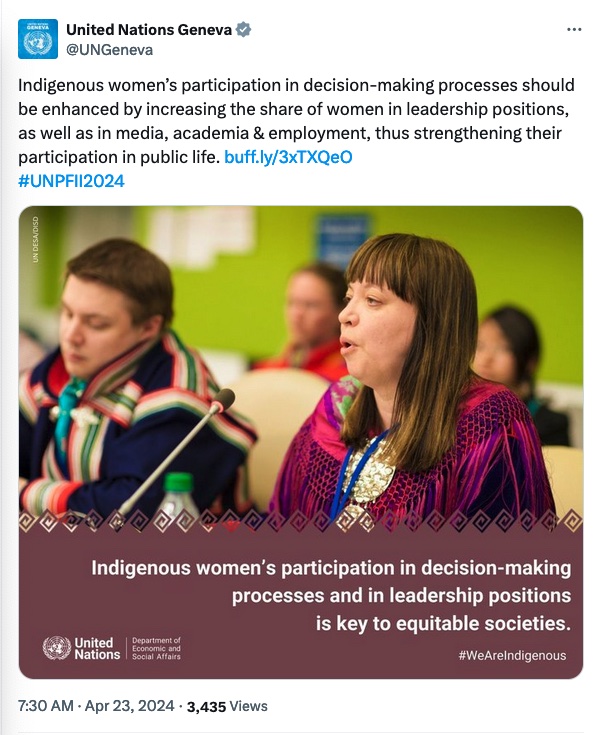The largest global annual gathering of Indigenous Peoples, the United Nations Permanent Forum on Indigenous Issues, is finishing up its 23rd session at UN Headquarters on the lands of the Lenape people in New York (15-26 April).
Below are links to some of the health-related reports considered at the meeting, as well as related social media posts (see more reports also in last week’s ICYMI column).
This study aims to promote dialogue in four areas:
(a) Increasing Indigenous-led health research and practice
(b) Expanding the number of policy tools to guide non-Indigenous local, regional and global authorities
(c) Recognising and operationalising within United Nations system entities the assertion in the Declaration that Indigenous Peoples are rights holders (not stakeholders)
(d) Engaging and partnering with legitimate Indigenous representatives as co-leads and advisers for policy- and decision-making groups across the United Nations, partner systems and Member States.
The document says the concept of Indigeneity must be considered as an overarching determinant of health, noting that Indigeneity “embodies Indigenous Peoples’ holistic, ecosystem-based and interconnected worldview, as well as the long-term mental, physical, spiritual and epigenetic effects of colonisation and neo-colonisation”.
This highlights the need to approach any Indigenous policy, initiative or project through the worldview of Indigenous Peoples, as distinct from those involving other minority or local populations, and from an intersectional perspective, considering aspects usually not included in colonial approaches (for example, territorial sovereignty, identity and self-determination constituting the foundation of spiritual, physical and psychological balance) as critical components of Indigenous health.
The study is structured around four key issues:
(a) Identifying aspirations and building support: how do Indigenous Peoples foster internal support for autonomy, and what strategies do they employ to engage their members and build consensus?
(b) Mapping the journey: what steps have Indigenous Peoples taken in their journey towards autonomy, ensuring broad support at each stage?
(c) Navigating the spectrum of autonomy: how do Indigenous Peoples manage their affairs, and how do they prepare for potential negotiations with the State?
(d) Equipping for effective negotiations: how do Indigenous Peoples build consensus for negotiations and secure comprehensive support for negotiated outcomes?
The study presents case studies of Indigenous autonomies and self-governments, including the Wampis Nation on the Ecuadorian border in north-east Peru, Indigenous people in Mexico City, Nepal, Namibia, and northern Canada, as well as the Sami whose lands extend across Finland, Norway, Sweden and the north-western part of the Russian Federation.
“Across all case studies, it can be observed that developing a unified vision was critical for internal consensus and effective negotiations with the State,” says the report.
“Likewise, strategic alliances with national and international bodies, including with other Indigenous Peoples, were crucial in advancing autonomy and self-government.”
• Criminalisation of Indigenous Peoples’ human rights
This report examines two kinds of criminalisation.
The first is pervasive and deeply embedded in laws, policies and attitudes. It is also often a function of structural racism and discrimination, especially when rooted in the non-recognition of Indigenous Peoples’ legal personality.
The second category concerns the more common understanding of the concept of the misuse of criminal law by State and non-State actors with the aim of criminalising the work of Indigenous human rights defenders (for example, for opposing government and private sector projects on their lands).
Violence, discrimination, denials of access to justice and impunity are also associated with repression and criminalisation, as are grossly disproportionate conviction, incarceration and recidivism rates, says the report.

• International expert group meeting on the theme “Indigenous Peoples in a greening economy”
This document reports on a meeting held in the United States earlier this year.
It says the green economy offers an opportunity to reinvigorate international efforts to achieve the Sustainable Development Goals.
For Indigenous Peoples, however, the green economy model must also promote the wellbeing of people in harmony with nature, in line with the United Nations Declaration on the Rights of Indigenous Peoples.
The report says the Declaration is not fully respected and implemented by many States, governments, the private sector and donors in such a way as to empower Indigenous Peoples’ systems of governance and self-determination, or to strengthen their economic and social systems, improve their health, enrich their educational, cultural and spiritual lives, or safeguard their knowledge systems and natural resources.
“In conclusion, the transition to a green economy without the right framework or regard for Indigenous Peoples’ rights will continue to produce historical injustices, marginalisation, discrimination and dispossession of their land and resources,” the report says.
“Indigenous Peoples’ organisations, including those representing or led by Indigenous women, youth, elders and persons with disabilities, must participate as right holders in decision-making, and their right to free, prior and informed consent must be respected.”
• Indigenous Peoples and the 2030 Agenda for Sustainable Development and implementation of the system-wide action plan for ensuring a coherent approach to achieving the ends of the United Nations Declaration on the Rights of Indigenous Peoples
This report includes responses from UN entities and others in response to a questionnaire on the actions taken to implement the recommendations of the Permanent Forum on Indigenous Issues, the system-wide action plan for ensuring a coherent approach to achieving the ends of the United Nations Declaration on the Rights of Indigenous Peoples and the 2030 Agenda for Sustainable Development.
• Enhancing Indigenous Peoples’ Right to Self-Determination: Amplifying Indigenous Youth Voices
This statement by the FSC Indigenous Foundation says: “Over 50 percent of the Indigenous population is under the age of 29, each carrying a legacy and a vision for their communities’ future. Today, we spotlight the pivotal voices of these Indigenous youth, who are not just the leaders of tomorrow, but active change-makers today.”
More commentary





See Croakey’s archive of articles on cultural determinants of health








